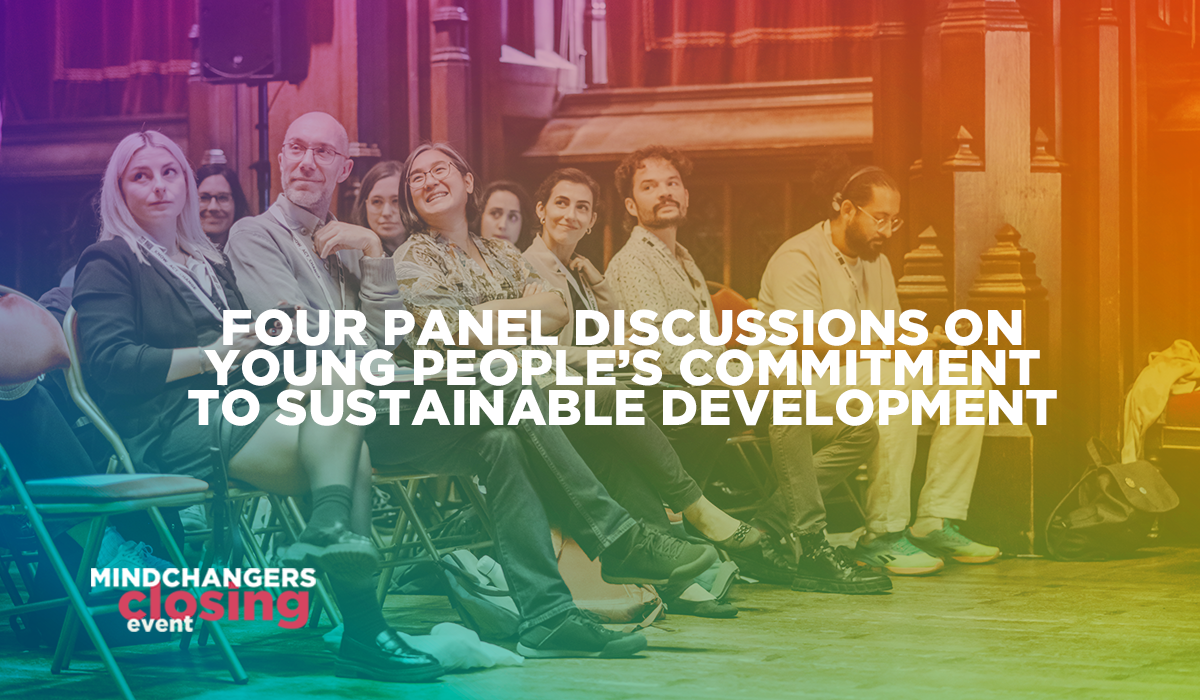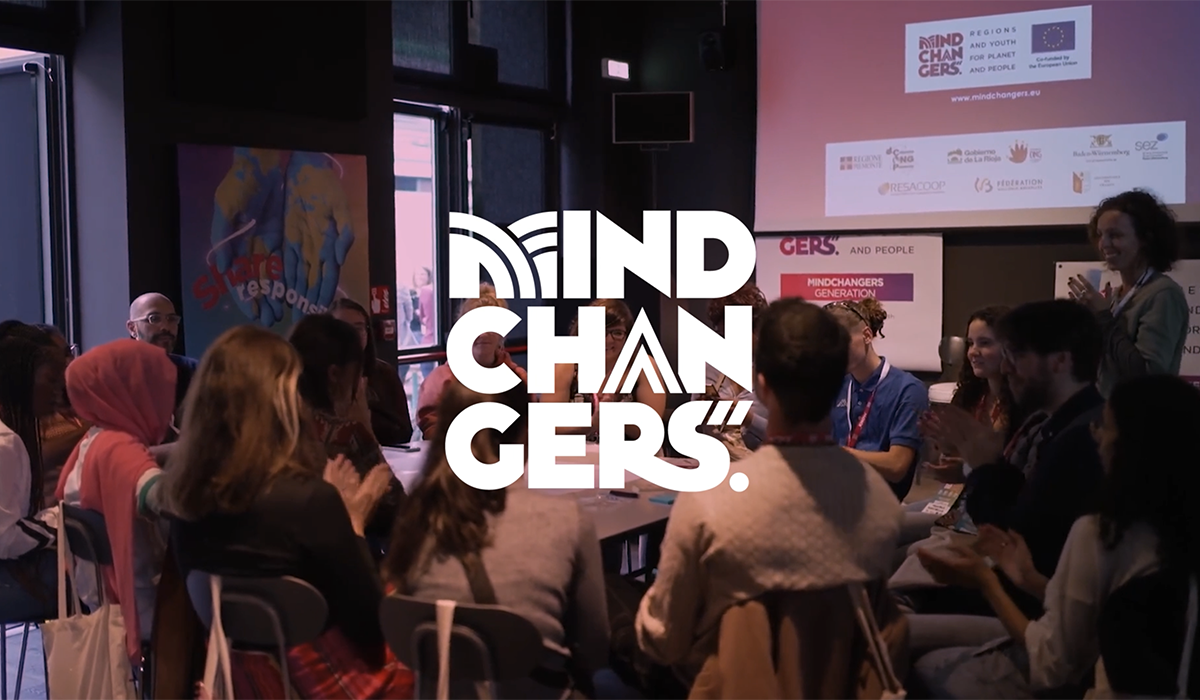During the closing event, four panel discussions on young people’s commitment to sustainable development were organised inviting experts from the European Commission, civil society and public offices.
These are the takeaways for each panel.
COMMUNICATION
How can we effectively empower young people to become active participants in the fight for social and climate justice? Communication serves as the lifeblood of activism. It ignites the spark of passion and engagement within young people, exposing them to the realities of inequality and injustice. It fosters collaboration, enabling them to connect with like-minded individuals and build powerful coalitions for change. Most importantly, communication empowers young people to become agents of change, equipping them with the tools and strategies to translate reflection into action. This session tackles this very challenge by exploring the transformative power communication detains nowadays.
Takeways of the panel: The power of communication lies in storytelling, as it sparks change. Local stories, particularly those of ordinary people, are crucial. Spaces and places are powerful tools for communication, as geography represents more than just physical locations—it embodies ideas and connections.
Civic technologies empower and engage people, giving them agency to drive change. Young people are innovating new ways to communicate, and educational institutions must provide them with tools to express themselves. Building communication skills among young people is essential. Communication offers many possibilities, and we must create more opportunities for youth to be heard.
In war, communication is crucial for safety, while in peace, it opens doors to causes like climate justice or gender equality.
For communication to drive behaviour change, it requires capability, opportunity, and motivation.
Strong words and images can spark dialogue on overlooked issues, while frustration can fuel meaningful online engagement.
Panelists: Sébastien Snoeck, Campaigner (BE); Chiara Sonzogni, Researcher, Computer Science
Department – University of Turin (IT); Hassan Alsalahi, Auvergne-Rhône-Alpes Grantee – F.O.L
69 Fédération des oeuvres laïques du Rhône et de la Métropole de Lyon (FR)
Moderator: Bianca Baumler, Senior Communications Expert – DEAR Support Team
YOUTH PARTICIPATION
How can we ensure a key and dynamic role of young people in shaping our society and achieving the Sustainable Development Goals? How can we transform the way we engage with and among the next generation of leaders? Fostering meaningful youth participation and strategies is capital for creating institutional space for young voices and overcoming barriers to civic engagement.
By highlighting successful models and sharing inspiring stories, this session will emphasise how integrating youth voices is not only possible, but essential for promoting innovation, progress, and inclusive decision-making.
Takeways of the panel: Youth participation aims to turn visions for the future into practice, offering the reward of tangible change in communities and young people’s selves.
Various dimensions of youth participation have been explored, highlighting that it means recognizing young people as experts and idea givers, listening to them and ensuring their ideas are followed up. Furthermore, youth participation is about fostering active engagement with decision-makers.
To ensure meaningful youth participation, two key approaches must be considered. First, from the perspective of technicians and administrators, it is crucial to create both formal and informal spaces where young people can engage, acting as facilitators who connect them with decision-makers and providing access to necessary funding. On the other hand, activists need to recognize their own power, start with small, manageable actions, and focus on causes they are passionate about. Ultimately, youth participation is about sharing power, addressing the inputs, needs, and desires of young people. Effective participation requires intergenerational and intersectional collaboration, as well as sustained, long-term engagement and continuous effort from all parties involved.
Panelists: Laszlo Foldi, Project Coordinator – Bureau International Jeunesse (BE); Gilberto Morishaw, Youth Delegate – EU Youth Sounding Board; Navika Deol, Baden Württemberg Grantee – Dachverband Entwicklungspolitik Baden Württemberg e. V. (DE); Davide Gandolfi, Head of the International Relations and Cooperation Department – Regione Piemonte (IT)
Moderator: Julien Puissant, Mindchangers National Project Coordinator – RESACOOP (FR)
YOUTH POLICIES & PRACTICES
How can we guarantee policies and practices that recognize and promote young people’s engagement?
In this very uncertain time, young people around the world are advocating for change. They are committed in everyday actions to reduce their personal impact on the environment, and, in the long term, they are engaged in civic initiatives for a more sustainable and fairer world. This session will address policies and practices supporting youth engagement.
Takeaways of the panel: The session offered a cross-sectional view of youth policies and strategies, in particular how young people can contribute directly to them through various mechanisms at local, national and even European level.
As an example, the “Youth Check” initiative has been presented: this initiative already exists in various countries and its adoption is currently discussed at the EU level. It aims at ensuring that EU policies consider the impact on young people during the policy design phase. Its goal is to make sure that the needs and voices of young people are considered across various policy areas.
The EU Youth dialogue initiative is a forum whose aim is to give a voice to young people, especially those with fewer opportunities, on a different thematic priority set by the Council of Youth Ministers in order to provide a reflection and follow-up on EU Youth Strategy. Beyond this kind of advisory bodies, local and national youth councils exist across many countries where young people can make decisions and have more than a consultative role, like “le Forum des jeunes” in Belgium. This type of decision-making process can also inspire young people to get involved as elected representatives in their own cities and increase the representativeness of young people’s voices and vision, as illustrated by the Italian Mindchangers grantee project.
Speakers stressed the importance of multiplying a variety of mechanisms to offer different modes of action, engagement and participation, in order to take into consideration the diversity of young people across societies.
Panelists: Kim Dang-Duy, Director, Administration for Youth – Ministry of Fédération Wallonie-Bruxelles (BE); Sabrina Di Carlo, Regione Piemonte Grantee -Spostiamo Mari e Monti (IT); Beatrice Ciobanu, Youth Delegate – Forum des Jeunes (BE)
Moderator: Béatrice Minh, Erasmus+ Coordination – Bureau International Jeunesse (BE)
YOUTH PERSPECTIVES IN FORMAL & NON-FORMAL EDUCATION
How can we ensure that both formal and non-formal education achieve the target 4.7 of SDG 4, which specifically emphasises the promotion of sustainable development, human rights, gender equality, a culture of peace and non-violence, global citizenship, and appreciation of cultural diversity?
The educational transformation requires that we listen to the perspective of youth who are the primary stakeholders. And this is exactly what we pursued with the Mindchangers outputs, to be showcased during this session.
Takeaways of the panel: Education on sustainability should start as soon as possible, considering also informal education that takes place within family and friends. It should be addressed from a long life learning perspective, integrated in all grades of school. Also, training of trainers must be considered. Therefore sustainability must be addressed with a “whole school approach” or as a cross-curricular topic.
Schools and teachers are considered as sources of opportunities but sometimes also as barriers to engagement. In a global perspective, we must also consider that a huge number of children and young people are not in school and that in some countries education is provided mainly by non-state actors.
Engagement should receive more formal recognition for example as credits. In addition to the impact on society, people gain social skills (teamwork, cultural and political skills, self confidence) that are difficult to integrate in the schools curriculum but needed and requested by youth.
Access to information about sustainability and opportunities is not equal, at the moment mainly privileged groups get it but we should change this, reaching minorities and marginalised groups through the collaboration with local actors, small organisations and adapting tools to the context.
Hope for the future: quality education accessible for all and international networks.
Panelists: Ioana Dewandeler, Policy Officer Higher Education – European Commission DG for Education, Youth, Sport and Culture; Rocío Cervera, Deputy Director – North-South Centre of the Council of Europe (PT); Alina Resceanu, Senior Lecturer – University of Craiova (RO); Nathalie Maelfait, BeGlobal Coordinator, Agence belge de développement – Enabel (BE)
Moderator: Müzeyen Tasdelen, Mindchangers National Project Manager – Stiftung Entwicklungs-Zusammenarbeit Baden-Württemberg (DE)



